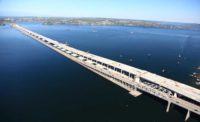Despite the state's highways being judged to be in poor condition, Texas infrastructure showed enough signs of improvement to earn a slightly improved overall infrastructure grade of “C” from the Texas Section of the American Society of Civil Engineers (ASCE), which released its 2021 Texas Infrastructure Report Card on Feb. 10. Texas infrastructure received a “C-” on ASCE's last report card, issued in 2017. A “C” score indicates infrastructure is “mediocre” and “requires attention.”
The association’s civil engineers graded the state on 12 infrastructure categories. The lowest scores went to wastewater and levees, which each received a “D,” followed by highways and roads and dams, each with a “D+.” The state received its highest grades for its energy infrastructure (“B+”) and solid waste (“B”). A score of “D” indicates “poor, at risk” infrastructure, while “B” means infrastructure is “good, adequate for now.” A brief of the report can be found here.
ASCE grades infrastructure on eight criteria: capacity, condition, funding, future need, operation and maintenance, public safety, resilience and innovation.
Speaking at a press conference Wednesday morning, Texas Infrastructure Report Card Committee chair Mark Boyd said that although the state’s infrastructure is in fair to good condition, it faces mounting needs from age and delayed maintenance. “A number of infrastructure elements are performing adequately, but the majority lack funding and face daunting challenges to properly address accelerated deterioration,” he said.
Among those challenges is population growth, coinciding with an increase in extreme weather events. “Texas finds itself poorly equipped to deal with environmental changes in the face of unprecedented growth,” said Boyd, a principal engineer at LCA Environmental. “Texas is growing by more than 1,000 persons per day, and as Texas civil engineers often quote, no one is unpacking water, sewer or roadway systems from their luggage as they’re arriving.”
The 2021 report highlights the fact that there is no state program governing Texas levees, which protect more than 1 million Texans and an estimated $127 billion in property. The local governing agencies that oversee the construction, inspection and maintenance of these structures often lack resources for routine assessments, according to the ASCE report. Also at risk are the state’s 7,200 non-federal dams, which would cost about $5 billion to rehabilitate, according to the report, citing a 2019 estimate by the Association of State Dam Safety Officials. One in four of these dams could result in loss of life if they fail, and the state exempts 3,200 of its dams from dam safety requirements, the report states.
Civil engineers found deficiencies in systems that collect and clean wastewater in Texas. The state faces a $200-million shortfall in federal and state funding for wastewater systems, which continue to decline because of age while being tested by extreme weather events. The number of sanitary sewer overflows more than doubled between 2016 and 2019, from 2,500 to almost 6,000, for instance, according to the report, which also indicated that some initiatives are helping curb the wastewater sector’s downturn through better reporting of overflows and incentives for training.
With its population growing and state vehicle travel up 16% from 2010 to 2016, Texas highway and roads encounter a continued need for expansion and updates, according to the report. At current funding levels and resources from the state’s gas tax, Texas faces a $15-billion annual funding gap through 2040.
To address the state’s infrastructure issues, the report recommends improving public and private leadership; public education; preparing for the future through sustainability and technology; land use planning that maintains a balance between built and natural environments; better collection and use of data; streamlined asset management; and increased and consistent infrastructure investments by raising fuel taxes and the passenger facility charge that Texas airports collect through airline tickets.
The ASCE will roll out its 2021 national Infrastructure Report Card on March 3.




Post a comment to this article
Report Abusive Comment